Posts tagged treatment
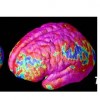
A new superdrug that fights pneumonia, pimples AND schizophrenia? Meet Minocycline.
Mar 26th
A cheap drug called Minocycline, which is normally prescribed for pneumonia and acne will be tested in a new trial to reduce the symptoms of psychosis in patients suffering from schizophrenia.
Schizophrenia is a mental disorder characterized by a breakdown of thought processes and by poor emotional responsiveness. According to the WHO the disorder affects around 0.3–0.7% of people at some point in their life, or 24 million people worldwide as of 2011. There is no general cure and the pharmacologic treatment of schizophrenia leaves much to be desired.
Now the National Institute for Health Research in the U.K. is funding a large research trial on More >
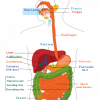
Guts against Diabetes
Mar 21st
For a very long time I have been using Diabetes as an example of a disorder that is caused by a mutation in the insulin gene. This mutation would stop the cells from making insulin, and a diabetic might need daily insulin injections to regulate their sugar levels properly. I don’t know what took me so long to realize that this was completely wrong. That while some diabetics are insulin dependent, it is because their insulin-producing cells of the pancreas are being completely destroyed by the immune system. And while they still aren’t sure about why these cells are being More >
New Hope for Alzheimer’s Sufferers
Feb 13th
This article in science is good news for suffers of Alzheimer’s. A group out of Case Western University reports that the drug Bexarotene can reverse the symptoms of Alzheimer’s in mouse models of the disease.
More importantly, Bexarotene is already in use in human patients, making it easier to determine if the drug will have similar benefits for Alzheimer’s patients.
According to Alzheimer’s Foundation statistics, 5.4 million Americans suffer from this debilitating disease. Alzheimer’s devastates patient’s cognitive abilities, with the most notable symptom being profound and worsening memory loss. While some amount of memory loss is to be expected with old age, Alzheimer’s patients More >
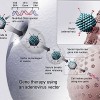
Merry Christmas to Hemophilia Patients
Dec 15th
Gene therapy is a technique that offers the potential to replace defective copies of genes in any genetic disease with an intact version. While the idea of this treatment sounds alluring, the actual practice of it is a whole other story. There are a few drawbacks to this technique that must be considered, including the potential risk of an immune response because the gene is inserted with the use of a virus, which the immune system will see as foreign. Also, most patients so far have needed multiple treatments over the course of their lifetime, estimating to cost much more More >
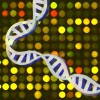
Harnessing the power of bioinformatics in cancer research
Nov 22nd
One of the biggest challenges facing cancer researchers is that the disease varies so much from person to person. Even the same type of cancer – lung, brain, breast, colon, and so on – can be subtly different. This means that a therapy that works well in one patient may have no effect in another.
So researchers in the UK brought in the big guns – bioinformatics.
Cancer Research UK has set up seven British centers to start collecting 9,000 tumor samples from a wide range of cancer patients to create a DNA database. Researchers will extract DNA from these tumors and More >

Brain tumors snack on cholesterol
Sep 19th
Researchers at the University of California Los Angeles and Ohio State University Comprehensive Cancer Center are investigating a new treatment for glioblastoma, the deadliest form of brain cancer. Their paper, out this week in Cancer Discovery, shows how blocking a mechanism involved in cell metabolism and triggered by a cancer gene can reduce brain tumors.
Glioblastoma affects about 18,500 Americans each year, with less than More >
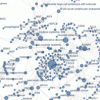
Cancer Genomics: so many mutations!
Feb 18th
The human genome is the complete collection of over three billion bases in each of our cells. Cancers accumulate multiple changes, or mutations, in their DNA that contribute to the disease by changing how cells behave. For instance, cancers need nutrients to grow. Very often, they get these nutrients by producing signals that encourage new blood vessel formation. Finding the mutations that lead to cancer is very difficult. For one thing, even for cancers that affect the same tissue and look similar, the mutations can be very different. Also, one of the hallmarks of cancer is an increased rate of More >
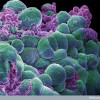
Why no cure for cancer?
Aug 5th
I was looking through some of the comments on the blog and thought I would address a few of them, as I imagine others would have similar questions. One reader wanted to know why some cancers are more fatal than others. For example, the five-year survival rate for prostate cancer is nearly 99%, while it is 4% for pancreatic cancer. There are several reasons for this. First, some cancers are by nature slow growing and unlikely to spread through the body, like prostate cancers, while other cancers are very aggressive and often metastasize. Another issue is diagnosis: there are good More >
AIDS Cure?
Feb 5th
How do you cure a man of both leukemia and AIDS with just one procedure? No, it’s not a trick question: an American leukemia patient living in Berlin received a bone marrow transplant that also resolved his AIDS.
In a bone marrow transplant, a patient’s own marrow is destroyed and replaced with tissue from a donor. The donor marrow contains healthy hematopoietic stem cells (HSCs, adult stem cells in the blood) which repopulate the patient’s body with healthy red and white blood cells for oxygen transport and immune defense. Just as with other varieties of organ donation, tissue-type matches are critical. In the case of More >

